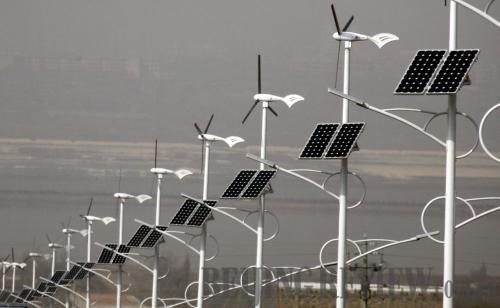|
 |
|
LOW-CARBON LIGHTS: Road lights are powered by solar and wind energies on Yanhu Thoroughfare in Yunchen City, east China's Shanxi Province, February 3, 2010. These recently installed energy-saving lights have special features that optimize energy structure, improve air quality and cut emissions (XINHUA) |
The newly amended Energy Law has been submitted to the Legislative Affairs Office of the State Council, China's cabinet, for further amendment and approval, after which it will be delivered to the State Council for further discussion. The news was disclosed by Wu Yin, deputy head of the National Energy Administration (NEA) Under the National Development and Reform Commission, at a recent forum concerning energy, economy and development.
Priority will be given to energy legislation this year, said Yin. The overarching Energy Law will be supported by other laws concerning coal, oil and natural gas, power, renewable energy and energy conservation.
The Legislative Affairs Office plans to deliver the draft energy law to the standing meeting of the State Council this year. If passed by the cabinet, the Energy Law will then be delivered to the National People's Congress (NPC), China's parliament, for discussion and final approval, according to Caijing magazine.
The NPC requires three rounds of discussion for each law, each lasting about three months. That means if everything goes smoothly, the Energy Law will take effect in 2011.
Energy legislation has drawn wide attention. The energy law draft group was established in January 2006. Starting May 1, 2006, regulators solicited opinions and suggestions on the energy law from the public. The law draft group published the first draft for public comment from December 2007 to February 2008.
The draft was amended in November 2008 by the NEA, then delivered to related ministries for another round of assessment.
The Chinese Government views the energy issue as vital for maintaining sound and sustainable economic development. On January 27, 2010, the government established the National Energy Commission (NEC), headed by Premier Wen Jiabao. The deputy head is Vice Premier Li Keqiang, and members include leaders from the ministries of finance and foreign affairs, as well as the National Development and Reform Commission. The new agency, which outranks the NEA, is now the highest energy regulator in China.
China's energy administration system, following the establishment of the NEC, has basically formed. The NEC is responsible for formulating strategic policies, while the NEA acts as an executive body.
"China faces the arduous task of cutting 45 percent of carbon dioxide emissions per unit of GDP by 2020 from the 2005 level, a goal that was set shortly before the Copenhagen summit last year. The Energy Law is therefore very important for China's healthy and sustainable development," said Han Xiaoping, an energy expert at China5e.com, a professional energy website.
To reach the target, China first needs to adjust its energy structure, shifting from coal to natural gas as the main source of energy. Second, China needs more people to participate in the campaign to save energy and reduce emissions. Finally, China needs to make full use of clean energy, Han said in an interview with China Business News.
"Efforts to reach the target may require a series of reforms that will not only reform the energy industry, but also overhaul the economic system. The Energy Law, therefore, is an important law to lay a sound foundation for adjusting the energy structure," said Han, who is also one of the members of the energy law draft group.
As for when the final version of the Energy Law will be completed, Han said it will be a while because "opinions from various enterprises and government departments must be solicited during the lawmaking process."
According to Han, lawmakers have taken full consideration of energy security and energy storage in the energy law, which will include requirements for storage time, amount and types of energy products. For instance, the electricity shortage that occurred last year was due to insufficient coal storage.
"Since the energy law was drafted two years ago, the draft was recently amended to add content on addressing climate change," said Ye Rongsi, deputy head of the energy law draft group, who is also the head of the Energy Law Academy under the China Law Society.
The discussion phase of the Energy Law covers topics such as sustainable use of energy, energy security, energy saving and emissions reduction, as well as power grid construction and new energy development. | 